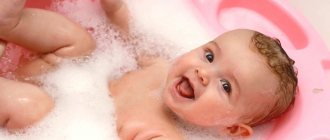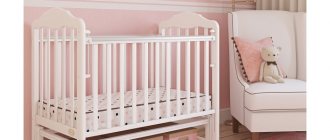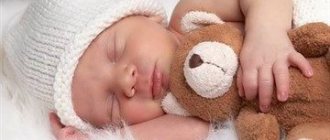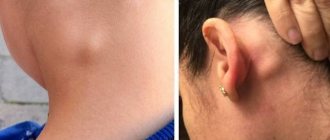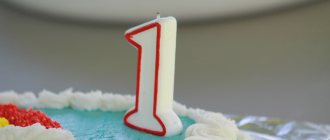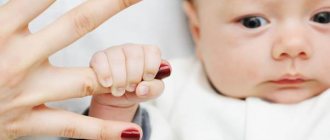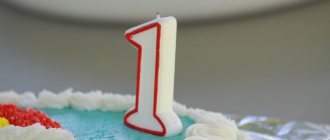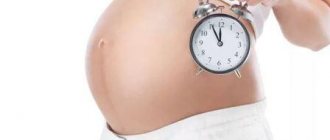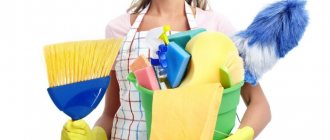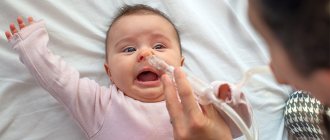08.10.2020 6662 0
The skin of a small child is very delicate and sensitive, and you need to care for it correctly to avoid skin diseases, diaper rash, dryness and other problems. This aspect should be given especially close attention: the child cannot yet say for himself what he needs, his body is just beginning to adapt to life. Therefore, proper skin care for a newborn is very important: use proven products, do not neglect skin care procedures, but also do not overuse. A happy and healthy baby is the most important thing for new parents.
What does a newborn baby need at home to sleep comfortably?
First, you need to decide in which room the child will sleep. In the first days of a baby's life at home, it is especially important that parents can quickly come when he calls them. For this reason, most moms and dads install a crib in their bedroom. In some families, a separate children's room is equipped in the house or apartment for a newborn, and communication with it is ensured using a baby monitor. This option has its advantages, for example, you do not have to compact the layout of the marital bedroom or give up the habit of sleeping with an open window. However, a baby monitor, like any household appliance, can fail unexpectedly, so it is important for you to make sure that you can hear your baby's cry even through the door.
If you think the room needs renovation, try to do it early. When a newborn baby is at home, there should be no smell of paints and varnishes, and some chemical odors can take weeks to dissipate. Construction dust is also harmful to the baby, as it is almost impossible to remove at one time, and may require two or three cleanings with a break of several days.
So, the room is ready. Now you need to find a place for the crib with an ideal microclimate - with good ventilation and lighting, but without drafts, direct sunlight and not near the battery. It is advisable that from the crib you can observe what is happening around - this way the baby will begin to explore the world immediately after the maternity hospital.
What else should be prepared at home for a newborn's sleep?
Blanket
Immediately after the maternity hospital, the baby will need a blanket, there should even be two of them - for warm and cold weather. However, you can do without blankets at all. Today, sleeping bags for infants are becoming increasingly popular. They do not restrict the baby's movement and are often all-weather: in winter the bag is used with sleeves, and in summer they are unfastened.
Bed sheets
The bedding essentials for a newborn at home are a sheet and a duvet cover, but if you plan to use a sleeping bag, you only need to buy sheets. On the baby’s first day at home, and even in the first year after the maternity hospital, the baby not only does not need a pillow, but is even harmful. While the baby's vertebrae are mobile, he must sleep on a flat surface, otherwise he risks getting a curvature of the spine. Also, the pillow can block the baby's airway, which is very dangerous. Accordingly, you don’t need to buy pillowcases yet.
The baby should have at least two sets of bed linen - he sleeps on one while the second is washed or dried. However, in case of unforeseen circumstances, it is better to have a small reserve.
Night light
A night light can come in handy if your baby is afraid to sleep without light, and this is a fairly common occurrence. Do not turn on the night light in the first days of the newborn at home; there is no need to specially teach the baby to sleep in the light. Only start using it if you notice that your baby is fussy and crying in the dark. This device can be purchased at a children's goods store, but any “adult” lamp with adjustable brightness will also work.
Thermometer
The temperature of the home for newborns should be maintained between 18–22 °C. It is difficult to estimate the temperature based on your own feelings, so buy a thermometer. He will give an exact answer to the question of what to do at the moment - heat the room or cool it. When the apartment is cool, use an electric heater; when it is hot, open the window or turn on the air conditioner. But if you feel that air currents are reaching the crib, you will have to abandon automatic air conditioning. Switch to manual mode: take the baby out of the room, cool it, turn off the air conditioner (close the window), bring the baby back, repeat as necessary.
It's even better if, in addition to the thermometer, you buy a hygrometer - a device that shows humidity. There are weather stations that combine both functions. Heating appliances dry out the air a lot, and this is not what is needed after the maternity hospital. To create a comfortable environment for your baby at home, buy an air humidifier or use traditional methods - a spray bottle, wet towels on a radiator, etc.
What is needed for bathing at home in the first days of a newborn’s life?
Bathing is a very important skin care procedure for your baby. Water washes away dirt and bacteria from your baby's body, reducing the risk of diaper rash. The baby needs to be bathed about 3 times a week. Therefore, before welcoming your newborn home, you must purchase everything necessary for water procedures.
Baby bath
Already on the baby’s first day at home, almost immediately after the maternity hospital, he will have to bathe, and for this he must have his own bath. The word “own” means that it is intended only for bathing the baby. Washing, folding dirty laundry and otherwise using the bath for other purposes is strictly prohibited.
It is advisable to think in advance where you will place the bath while bathing. If anything, placing it on the bottom of the bathtub is not the best idea: you will make a lot of unnecessary movements and unnecessarily strain your back muscles.
Slide
When bathing your baby, his head should always be raised above the water. The baby cannot cope with this task on his own, so in the first days and even months of the newborn at home, the mother has to hold his head. It’s inconvenient when one hand is constantly occupied, but there is a way out - a slide. This simple device supports the baby's body in the correct position and greatly facilitates the bathing procedure.
You don’t have to buy the slide separately - there are baths that already have it. In some models, the slide is part of the bath; in others, it can be removed and put away when no longer needed.
Bathing products
What should be on the baby shelf in the bathroom in the first days of a newborn at home? Soap and shampoo, nothing else. Moreover, it is recommended to use them only once a week, and during all other baths the baby is washed with water.
Perhaps you want to bathe your girl or boy in fragrant foam, buy a bunch of jars and bottles with various pleasant skin and hair care products. You can do all this, but later. The skin of a newborn is very delicate, and now the safest remedy for him is the simplest - regular baby soap.
Inflatable collar
An inflatable collar will not be needed during the newborn's first days at home. This accessory is used for bathing the baby in a large bath, which can only be done after the child has learned to sit. However, since you have decided to buy everything you need for swimming, buy a collar right away. It holds the baby's head above the surface of the water and prevents him from swallowing water during an awkward movement.
Features of newborn skin
From the moment of birth, the baby's body is covered with a cheese-like whitish lubricant. This substance protects the baby from various injuries, because it has a very difficult time passing through the birth canal. Most of the lubricant accumulates on the baby’s ears, face and armpits. The composition of the lubricant is obvious: these are epithelial cells, fats and intermediate products of carbohydrate metabolism. After birth, the baby's body is gently washed in warm water.
The skin of newborn babies is usually very red. Simple erythema or physiological catarrh is reactive redness of the skin after removal of vernix and the first bath. Erythema intensifies on the 2nd day and disappears by the end of the 1st week of life.
Very often, the baby’s delicate skin is covered with lanugo, baby down.
However, after 2-3 days the skin begins to peel off, and the baby suffers from increased dryness. As a rule, the baby's skin begins to peel off on the feet and hands, but the older the newborn becomes, the smoother and softer its skin becomes.
How to care for a newborn at home?
Caring for a newborn is not as difficult as it seems at first glance. Within a few days after the maternity hospital, you will learn how to change diapers with your eyes closed, masterfully wipe the folds of your baby’s body and cut his nails. And here's what you need for this.
Baby changing table
From the first day after the hospital, you will have to change your baby's clothes often, several times a day. Doing this on a bed or sofa is inconvenient; on a regular table it is not very hygienic. The ideal solution is a special changing table.
If you don't want to spend money on something that won't last long, consider alternative options. A chest of drawers with a changing table at the same time allows you to store children's things and accessories, and in the future it will become just a chest of drawers. A changing board or changing mat takes up little space and turns any flat surface into a table.
Diapers
While changing clothes, the baby should lie on a clean diaper. Thrifty parents prepare regular textile diapers for their newborn baby at home and wash them as needed. Disposable diapers will cost a little more, but, of course, they are much more practical.
Diapers
Your baby will need a lot of diapers. The health of your child’s skin directly depends on their quality, so choose products with a reliable reputation. Make no mistake when purchasing: diapers must match the baby’s body weight. For example, in the Huggies line of diapers for newborns there are three sizes: for babies weighing up to 3.5 kg, for boys and girls of normal build, and for little heroes.
Use Huggies Elite Soft Newborn Diapers These soft pad diapers absorb loose stool in seconds. Baby's skin remains clean and protected. Huggies Elite Soft for newborns can always be purchased in the online stores of our partners.
Disposable wipes
Disposable wipes are a wonderful invention that makes it easier to care for a newborn’s skin at home and especially when out for a walk or while traveling. Thanks to the excellent absorbent properties of modern diapers, there is usually no need to wash your baby when changing your baby. Just wipe your baby's skin with a napkin and you're done!
We recommend using Huggies Elite Soft wipes. They are made from natural fibers, do not contain fragrances and are safe from day one.
Skin care products
The baby will need baby cream and oil, but it is better to find out which ones exactly from a specialist - each child’s skin has individual characteristics. You may need to purchase other care products, for example, to combat diaper rash. But it’s better to prevent them from occurring at all. To do this, make sure that the baby does not overheat, bathe him every day, let his skin breathe after water procedures and, of course, change diapers regularly - at least every 3-4 hours.
Care tools
Already in the first days of a newborn at home, he should have his own comb. And special tweezers with rounded ends for cutting nails. By the way, here's a useful life hack: babies sleep soundly, so cutting their fingernails and toenails is easier and faster in their sleep.
Clothes for newborn girls
Caring for your baby also involves careful selection of clothing. The most important rule is that there should be no synthetics. Make sure that all items are made exclusively from natural fabric. Wash things only with baby powder, which does not contain phosphates or other substances that are dangerous to children’s delicate skin. In the first month after the birth of a girl, steam all things from the inside and outside, iron them thoroughly. Modern irons allow you to do this quickly and efficiently.
It’s worth saying a few words about diapers, which simplify the life of every modern mother. Choose them according to the baby’s age and weight. Care and hygiene for a newborn girl involves using diapers only while walking or sleeping. While awake, it is better to be without diapers. It is worth noting that if the room is more than 25 degrees and you are still wearing a diaper, this can cause severe irritation and diaper rash. In the summer, it is better to use diapers made from natural fabric.
What do you need for walks in the first weeks after maternity hospital?
To walk with your baby, you will have to put together a fairly serious wardrobe - at a minimum, it should include a vest, rompers, a bodysuit, overalls, a cap and an envelope blanket. Most mothers are not intimidated by this list; on the contrary, they are happy to immerse themselves in choosing the first clothes for the child. The main thing is not to buy too much: remember that most of the things will grow out of the baby in the very near future.
What else do you need for a walk?
Stroller
Choosing a stroller is a big and serious topic. From the first days after the maternity hospital until the baby learns to sit, a stroller-cradle is needed for walks. You can also purchase a “2 in 1” transformer (if necessary, turns into a stroller) or “3 in 1” (also with a car seat). However, you have to pay for versatility in weight and dimensions.
Think in advance about how you will leave the house with your newborn, where you will go, and how you will return back. Is there a wheelchair or freight elevator at your entrance? Will there always be someone next to you to help you carry the stroller? Where will you be walking—on tiled sidewalks or on dirt paths? All this matters when choosing.
Baby car seat
The baby will have to get acquainted with a child's car seat immediately after the maternity hospital. And literally: in the car in which you go home, it must be there. Don’t even think about the fact that the baby will be safer in the mother’s arms. From birth, the little passenger should only ride in a car seat.
If your baby will have to travel frequently in the car, buy a carrier marked “0+” - it is light and comfortable, but the baby will outgrow it in about a year and a half. Another option is the “0+/1” chair. It can be used from the first day after maternity hospital up to four years, but it has a more bulky design.
Walking bag
When leaving home with a newborn baby, it is advisable not to forget anything. Do not put the necessary things in the pockets of the stroller and your own handbag - have a separate bag for walks.
What else is needed in the first days of a baby’s life at home?
Just surround your child with care and love, and everything else can be purchased as needed!
Caring for a newborn in the first month of life
If you haven't spent much time around newborns, their fragility can be daunting.
Rules for caring for a child in the first month of life
- Be sure to wash your hands before handling your baby. Newborns do not yet have strong immunity, so they are susceptible to infection. Make sure that everyone who interacts with the child has clean hands;
- Be careful to support your baby's head and neck when carrying him or placing him in the crib;
- Don't shake your newborn, whether in play or frustration. Severe shaking can cause intracranial bleeding and even death. If you need to wake up your baby, don't do it by shaking the baby. Instead, tickle your baby's feet or gently stroke his cheek;
- You must make sure that the baby in the carrier, stroller or car seat is properly secured. Limit any activity that may be too rough or vigorous for your baby.
Remember that a 1 month old newborn is not prepared for rough play such as shaking or tossing.
